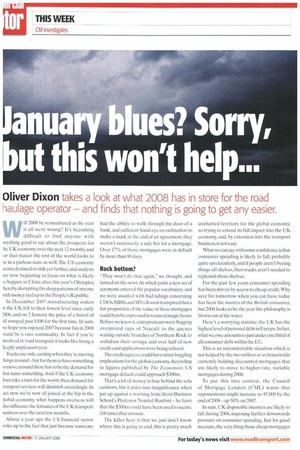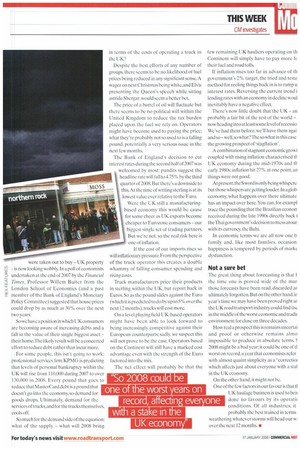Oliver Dixon takes a look at what 2008 has in
Page 18

Page 19

If you've noticed an error in this article please click here to report it so we can fix it.
store for the road haulage operator — and finds that nothing is going to get any easier.
Will 2008 be remembered as the year it all went wrong? It's becoming difficult to find anyone with mything good to say about the prospects for he UK economy over the next 12 months, and or that matter the rest of the world looks to x in a parlous state as well. The US economy ;eems destined to sink yet further, and analysts ire now beginning to focus on what is likely o happen in China after this year's Olympics, hereby disrupting the sleep patterns of anyone vith money tied up in the People's Republic.
In December 2007 manufacturing orders n the UK fell to their lowest level since early !006, and on 2 January the price of a barrel of )il romped past $100 for the first time. In sum, ve hope you enjoyed 2007 because fun in 2008 :ould be a rare commodity. In fact if you're nvolved in road transport it looks like being a leeply unpleasant year.
Trucks are only earning when they're moving hi ngs around—but for them to have something o move around there has to be the demand for hat same something. And if the UK economy loes take a turn for the worst, then demand for ran sport services will diminish accordingly. In act now we're now all joined at the hip in the ;lobal economy, what happens overseas will ilso influence the fortunes of the UK transport )usiness over the next few months.
About a year ago the US financial sector yoke up to the fact that just because someone had the ability to walk through the door of a bank, and sufficient hand-eye co-ordination to make a mark at the end of an agreement, they weren't necessarily a safe bet for a mortgage. Over 17% of those mortgages were in default by more than 90 days.
Rock bottom?
"They won't do that again," we thought, and turned on the news, At which point a new set of acronyms entered the popular vocabulary, and we were assailed with bad tidings concerning CD0s,MBSs and SIVs. It soon transpired that a fair proportion of the value of these mortgages could best be expressed in terms of magic beans. Before we knew it. entrepreneurs were flogging overpriced cups of Nescafe to the queues waiting outside branches of Northern Rock to withdraw their savings, and over half of new credit card applications were being refused.
The credit squeeze could have mind-boggling implications for the global economy.According to figures published by The Economist, US mortgage default could approach $300m.
That's a lot of money to lose behind the sofa cushions, but it pales into insignificance when put up against a warning from Stern Business School's Professor Nouriel Roubini — he fears that the $300m could have been used to secure 100 times that amount.
The killer here is that we just don't know where this is going to end; this is pretty much uncharted territory for the global economy, so trying to extend its full impact into the UK economy, and, by extension into the transport business, is not easy.
What we can say with some confidence is that consumer spending is likely to fall. probably quite spectacularly, and if people aren't buying things off shelves, then trucks aren't needed to replenish those shelves.
For the past few years consumer spending has been driven by access to cheap credit. Why save for tomorrow when you can have today has been the mantra of the British consumer, but 2008 looks to be the year this philosophy is blown out of the water, Here's a worrying statistic: the UK has the highest level of personal debt in Europe. In fact, what we owe amounts tojust under one third of all consumer debt within the EU.
This is an uncomfortable situation which is not helped by the two million or so households currently holding discounted mortgages that are likely to move to higher-rate, variable mortgages during 2008.
To put this into context, the Council of Mortgage Lenders (CML) warns that repossessions might increase to 45,000 by the end of 2008— up 50% 00 2007.
In sum, UK disposable incomes are likely to fall during 2008, imposing further downwards pressure on consumer spending. Just for good measure, the very thing those cheap mortgages were taken out to buy — UK property -is now looking wobbly. in a poll of economists undertaken at the end of 2007 by the Financial !limes, Professor Willem Buiter from the London School of Economics (and a past member of the Bank of England's Monetary Policy Committee) suggested that house prices could drop by as much as 30% over the next two years.
So we have a position in which UK consumers are becoming aware of increasing debts and a fall in the value of their single biggest asset — their horn e.The likely result will be a concerted effort to reduce debt rather than incur more.
For some people, this isn't going to work; professional services firm KPMG is predicting that levels of personal bankruptcy within the UK will rise from 110,000 during 2007 to over 130,000 in 2008. Every pound that goes to reduce that MasterCard debt is a pound that doesn't go into the economy, so demand for goods drops. Ultimately, demand for the services of trucks, and for the trucks themselves, cools off.
So much for the demand side of the equation; what of the supply — what will 2008 bring in terms of the costs of operating a truck in the UK?
Despite the best efforts of any number of groups, there seems to be no likelihood of fuel prices being reduced in any significant sense. A wager on next Christmas being white, and Elvis presenting the Queen's speech while sitting astride Shergar, would seem a better bet.
The price of a barrel of oil will fluctuate but there seems to be no political will within the United Kingdom to reduce the tax burden placed upon the fuel we rely on. Operators might have become used to paying the price; what they're probably not so used to is a falling pound, potentially a very serious issue in the next few months.
The Bank of England's decision to cut interest rates during the second half of 2007 was welcomed by most; pundits suggest the headline rate will fall to 4.75% by the third quarter of 2008.But there's a downside to this. Ai the time of writing sterling is at its lowest value ever relative to the Euro.
Were the UK still a manufacturingbased economy this would be cause for some cheer as UK exports become cheaper to Eurozone consumers— our biggest single set of trading partners. But we're not, so the real risk here is one of inflation.
If the cost of our imports rises so will inflationary pressure. From the perspective of the truck operator this creates a double whammy of falling consumer spending and rising costs.
Truck manufacturers price their products in sterling within the UK, but report back in Euros. So as the pound slides against the Euro (which it is predicted to do by up to 5% over the next 12 months), trucks will cost more.
On a level playing field UK-based operators might have been able to look forward to being increasingly competitive against their European counterparts; sadly. we suspect this will not prove to be the case. Operators based on the Continent will still have a marked cost advantage even with the strength of the Euro factored into the mix.
The net effect will probably be that the few remaining UK hauliers operating on th Continent will simply have to pay more fc their fuel and road tolls.
If inflation rises too far in advance of th government's 2% target, the tried and teste method for reeling things back in is to ramp u interest rates. Reversing the current trend i lending rates with an economy in decline woul inevitably have a negative effect.
There's now little doubt that the UK — an probably a fair bit of the rest of the world — now heading into at least some level of recessio, We've had them before, we'll have them agar and so— was° what?The so what in this case the growing prospect of 'stagflation'.
A combination of stagnant economic growl coupled with rising inflation characterised th UK economy during the mid-1970s and th early 1980s: inflation hit 27% at one point, an things were not good.
At present,the S word is only being whispere but those whispers are getting louder, in a glob economy, what happens over there ultimate. has an impact over here. You can, for exampl trace the pounding that the Brazilian econonreceived during the late 1990s directly back i the Thai government's decision to mess arour with its currency, the Baht.
In economic terms we are all now one b family and, like most families, occasion happiness is tempered by periods of markc dysfunction.
Not a sure bet The great thing about forecasting is that t the time one is proved wide of the mar those forecasts have been read, discarded ar ultimately forgotten.But on the other hand,ir year's time we may have been proved right ar the UK road transport industry could find itst in the middle of the worst economic and tradir environment for close on three decades.
How real a prospect this is remains uncertai and proof or otherwise remains al mo impossible to produce in absolute terms. 5. 2008 might he a had year; it could be one of it worst on record, a year that economists refer with almost quaint simplicity as a "correctio, which affects just about everyone with a stal in the UK economy.
On the other hand, it might not be.
One of the few factors in our favour is that tl UK haulage business is used to ben done no favours by its opera tit conditions. Of all industries, it probably the best trained in terms weathering whatever storms will head our w over the next 12 months. •
































































































































































